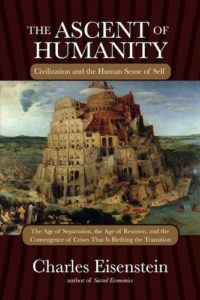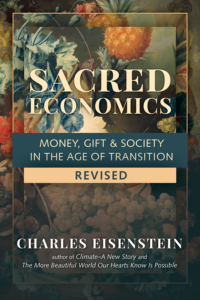Climate — A New Story
Chapters
Chapter 7: The Revolution is Love
The Conditions of Our Choice
Let us grant for a moment the premise of the technological fixers, that says climate change is not a problem because human ingenuity is limitless. If so, if we can manifest anything we put our minds to, then why settle for a world that grows uglier and more degraded with each passing year? And why settle for the inner desolation that accompanies it? Yes, perhaps we could use technology to compensate for the loss of ecosystem services. And yes, perhaps we could remediate the corresponding inner loss with technology too, with psychiatric medication, with “content-rich” virtual realities to compensate for the impoverishment of outer reality, with a profusion of diversions and stimulation to assuage the aesthetic, sensual, and psychic hunger caused by the depletion of the natural world. Perhaps we could.
But even if we could, we don’t have to. We could instead devote this “limitless human ingenuity” to the wholeness and beauty of the entire world, applying what might be called “technologies of reunion” to the restoration of inner and outer landscapes. Granted the prodigious power of the human will, we might change the question I just asked, “Why settle for a world that grows uglier and more degraded with each passing year?” into another: “Why have we settled for a world that grows uglier and more degraded with each passing year?”
If we cannot answer that question, and if we cannot change the conditions of that choice, then there is no hope that we will reverse course. No hope at all. We will continue to settle for what we have always settled for.
The conditions of our choice to settle for a degraded world are so ubiquitous and unremitting that we take them for reality itself. Together, they weave the mythology and experience of Separation in which we live.
I have already described the basic metaphysics of the Story of Separation: the discrete and separate self in an objective universe that is Other, populated by impersonal forces, generic bits of matter, and competing other selves. Here are some of the means by which it results in ecocide:
Through the present system of money and property, which, as I lay out in Sacred Economics, reifies and justifies the ideology of competing separate selves. Usually, discussion of the influence of money on the environment goes only so far as to blame corporate greed, government corruption, and irresponsible shopping habits. Outside of the Left intelligentsia (and all too rarely even there), we seldom see a trenchant explanation of how the deep structure of capitalism as we know it makes continued ecocide inevitable. This is such an important matter that I will devote a full chapter to it, because absent that understanding, we will fruitlessly pursue strategies of sustainable development, blind to its inherent contradiction.
Through ideologies of reductionism and linearity that cause us always to underestimate the consequences of our actions. The conception of nature as a fantastically complicated machine obscures its wholeness and the interrelatedness of its parts. We know in a human that damage to one organ or tissue reverberates throughout the entire body, but only recently has the dominant civilization begun to appreciate that this is true for the ecological body as well. Damage in one place, the extinction of one species, the draining of one mangrove swamp, is impossible to contain, but generates distant effects that require yet more intervention. For example, the mechanistic mindset says if insect damage to crops is the problem, then insecticides are the solution. And if the insecticide kills nontarget species that kept a fungus under control, then the solution is a fungicide. And if the fungicide damages mycelial networks that maintain soil integrity and water retention, the solution is irrigation. And when irrigation and chemicals exhaust or poison the aquifer, the solution is to pipe water in from somewhere else. On and on it goes—a series of technical fixes that postpone the consequences of the damage indefinitely into the future, and that distance effects from causes.
In other words, we have chosen to continually degrade the biosphere because we don’t know what we are choosing. Not knowing that Earth is an interconnected living body, we think we can isolate and contain the damage. We are mystified when it erupts somewhere else in changed form, its cause perhaps unrecognizable. Trapped in linear thinking, we again search for the most proximate, direct cause. Colony collapse disorder is killing the honeybees. Why? We try to find the cause, the pathogen, the enemy—something to fight against. Linear thinking is war thinking. Useful and appropriate sometimes, when exercised in ignorance of nonlinear feedback it results in an endless war against enemies created by the previous war. (Obviously this pattern holds in politics as well as in our relationship to the natural world.)
Today we are in an ideological transition zone between linear control-oriented thinking and nonlinear systems theoretic thinking. In genetics, for example, the old dogma of “one gene, one trait” has completely disintegrated as it becomes clear that no gene acts in isolation. The dream of genetic engineering—that we could precisely engineer organisms to have desirable traits without engendering any unexpected negative consequences—has proved to be a fantasy, as we discover that an organism might reconfigure itself entirely around an edit of just one gene. The part is inseparable from the whole.
Perhaps no field has been as crucial to this paradigm shift as ecology and Gaia theory. Ecosystems are rife with nonlinearity—symbiosis, positive and negative feedbacks, autocatalytic loops, trophic cascades, etc.—and homeostatic feedback mechanisms are how the planet maintains an environment hospitable to life.[7] Climate science recognizes this nonlinearity, but it has failed to grasp its full implications, especially when faced with the necessity of translating its findings into the language of policy. Thus it is that it emphasizes global variables (primarily greenhouse gases) that we can, in principle, control with top-down strategies while deemphasizing the contribution of localized ecocide.
Through the dulling of our empathy and numbing of our feelings. First, a worldview that holds other beings as less sentient encourages us to think of them as mere beasts, mere vegetation, or mere dirt, undeserving of empathy. It contradicts our native heart intelligence and our pantheistic intuitions that understand we are in a world alive with sentience. The heart must therefore overcome the mind to convert its empathy into conscious action. Moreover, the repeated denial of our felt kinship with the world is a kind of trauma that quashes empathy. We repeat the trauma every time we denounce another person or ourselves as flaky, irrational, or mushy for espousing empathic rather than utilitarian motives for environmental action.
Second, empathy and the ability to feel are blunted by trauma. In the extreme case, severe childhood trauma leads to dissociation. It hurts so much to feel, that the unconscious mind in its wisdom provides a numbness, encysting the pain until the child grows up and becomes strong enough to process it. Until that healing can occur, the person will have a diminished capacity to feel. She may seem normal, but that is only because disengagement from feeling has become normalized in modern society. That is in part because of the elevation of reason and dispassionate objectivity in our culture, and in part because trauma itself has become normalized. I refer here to the less obvious forms of trauma that the horrifying prevalence of extreme physical, sexual, and emotional abuse of children, of war and political oppression, of domestic violence and economic poverty, can obscure. We hardly notice it, so normal has it become—as normal as the diminished capacity to feel that results from it.
Some amount of trauma is unavoidable in life and in fact necessary for development. Many traditional cultures recognized this when they included traumatic experiences as part of initiation processes—experiences that were held in a ritual container and integrated thereafter. In our society, it is often otherwise. Trauma is either kept a shameful secret, or it is hidden behind class, race, and gender stereotypes, or it is rendered entirely invisible through its normalization.
What society takes for normal is actually traumatic. To be yelled at by parents, to be shamed for one’s sexuality, to be cast among strangers on the first day of school, to be exposed to intense depictions of violence on screen, to be deprived of frequent touch, to be confined to the indoors and playgrounds, to have ties repeatedly broken with frequent relocating, to experience the collapse of reality when parents divorce—if not all of these qualify as “trauma” in the same sense as outright physical abuse, they nonetheless contribute to a numbing of the capacity to feel.
On an airplane recently I watched a few minutes of an action movie that had been edited to make it more family friendly. Words like “bullshit” were changed to “bullshine” and “fuck” to “freak.” Naked female breasts were edited out as well. Preserved, though, in its grisly entirety was a scene in which a man was fed headfirst through a giant meat grinder. Such images are both symptoms and agents of the normalization of trauma. As long as society agrees they are less disturbing than a woman’s breast, can we ever hope to reverse the course of ecocide?
Finally, there is the trauma that accompanies economic, social, and political oppression. A brutalized or destitute person turns his or her attention to survival. It is not that the oppressed do not have “the luxury of empathy”—I have never found the poor to be less empathic than the privileged classes. If anything it is the opposite. However, the exigencies of daily survival might restrict the expression of that empathy to a narrow realm. Think of desperate displaced peasants in Brazil, working on roads, mines, or ranches in the Amazon. If they are numbed to the suffering of the forest, it is because they have to be in order to do what it takes to survive.
In general, survival anxiety is contrary to empathy, and it is not only the oppressed that suffer from it. The oppressors do as well. That is because we all live in a society of artificially created scarcity that hounds each of its members to get ahead of the rest. Our economic system has competition built into it. To make the most rational economic decision, often we must harden our hearts. Eventually the heart-hardening becomes a habit, a reflex, and a way of being.
Let me reconstruct the logic of the last few pages: in order to reverse the course of ecocide, we may have to consciously choose a healing path. We cannot count on collapse to compel us. In order to choose it, we need to change the conditions from which we are choosing. To change those conditions, we need to implement a different economic system and understanding of nature, and more importantly, we need to recover our empathic ability to feel. Therefore, the issue of environmental degradation and climate change cannot be separated from the need for social, economic, and personal healing.
To recover our ability to feel is going to hurt, because so much pain is out there waiting for us to feel it. It has been sequestered away, suppressed within ourselves and kept out of sight globally. On the outside, walls of cement and razor wire, walls of disinformation, walls of prisons, walls of gated communities, walls of historical blindness, and walls of complicit silence keep the dominant culture unconscious of the suffering of damaged peoples (human and otherwise). On the inside, it is false hopes, delusions, addictions, and pharmaceutical mind-control agents.
In the end, I do not believe that we can forever engineer our way out of the damage we have caused, any more than an alcoholic can forever postpone the pain by having another drink. Each technological response to conditions of increasing inhospitality to life involves greater and greater complication: more complicated social systems, more complicated technologies. Eventually, investments in complication reach a point of diminishing returns. Medicine, education, government, and the military are all groaning under the burden of bloated administrative structures that render them barely capable of carrying out the basic functions for which they were created. Eventually, such systems collapse under their own weight.
But again, the theoretical possibility of surviving on a ruined planet is a moot question when we could instead live on a beautiful, healed Earth. By extension, much of the debate about climate change is also superfluous for someone who is open to feel the pain to other beings that environmental damage causes. Whether or not it threatens our survival or that of our grandchildren, industrial civilization in its present form does grievous damage everywhere it operates. If this were the only form civilization could take, it might be an acceptable sacrifice.
I think a different kind of civilization is possible. The alternative and holistic, the indigenous and traditional, the innovative and inventive, and the regenerative and restorative show its contours. It is not just visionaries who have seen it. You, dear reader, have surely seen it too, bobbing in and out of sight as you struggle to keep your head above the choppy waters of habit and doubt. We are here to remind each other that it is there for the choosing.
End Notes
[7] At this point someone will hasten to unburden me of the notion that the biosphere maintains homeostasis; it is constantly changing, inviting newly fashionable terms like “homeodynamic.” Well, a body is not always perfectly constant either, but both body and planet exhibit remarkable constancy over time in key regards. For example, the salinity of the ocean has remained almost the same for hundreds of millions of years, despite a constant influx of salts. Global temperature has remained constant within a range of a few percent, despite a large increase in solar irradiance. Oxygen levels in the atmosphere have likewise stayed in a range that allows animal life. And so on.






